Health Library
Our Health Library information does not replace the advice of a doctor. Please be advised that this information is made available to assist our patients to learn more about their health. Our providers may not see and/or treat all topics found herein.
Breathing Problems: Using a Dry Powder Inhaler
A dry powder inhaler lets you breathe medicine into your lungs quickly. Inhaled medicine works faster than the same medicine in a pill. An inhaler lets you take less medicine than you would need if you took it as a pill.
A dry powder inhaler delivers medicine in the form of a fine powder. Dry powder inhalers are activated by breathing. When you breathe in through the inhaler, the powder medicine moves into your lungs.
Dry powder inhalers come in different shapes and sizes. For some, you need to add the medicine to the inhaler each time you use it. Some come with a supply of medicine already in them. For these, you'll need to "load" each dose of medicine each time you use it. How you load a dose depends on the type of inhaler you have. Read and follow all instructions for your inhaler.
How to use the inhaler
There are a few things to know before you start using a dry powder inhaler.
- Talk with your doctor, respiratory therapist, or pharmacist to make sure you are using your inhaler the right way. It may help to practice in front of a mirror. Use the inhaler exactly as instructed.
- Keep your inhaler in a cool, dry place. Do not store your inhaler in the bathroom. Moisture in the air can cause the dry powder to clump together and clog the inhaler.
- Keep track of how much medicine is in the inhaler. Some dry powder inhalers have dose counters that show how many doses are left in the inhaler. If your inhaler does not have a dose counter, your doctor or pharmacist can teach you how to keep track of how much medicine is left.
- Follow your doctor's or pharmacist's instructions for cleaning your inhaler. Some powder may build up on the inhaler, but you don't need to clean it every day.
- You may have other inhalers that you use for different medicines. If one of them is a metered-dose inhaler (which sprays out a mist of liquid medicine), you might be using a spacer with it. But you should not use a spacer with a dry powder inhaler.
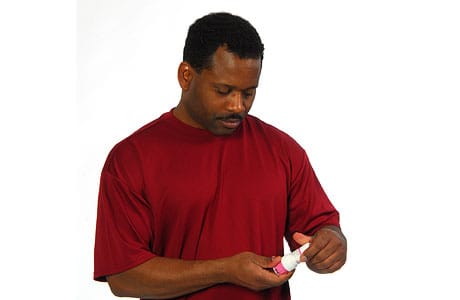
Check that you have the correct medicine. If you use several inhalers, put a label on each one so that you know which one to use at the right time.
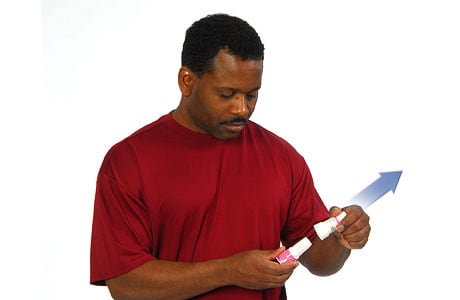
Remove the cap from the inhaler, if there is one.
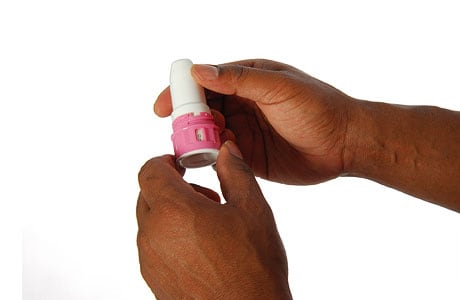
Load the inhaler. Add or load a dose of medicine as instructed by your health care provider. Your inhaler may look different from the one pictured.
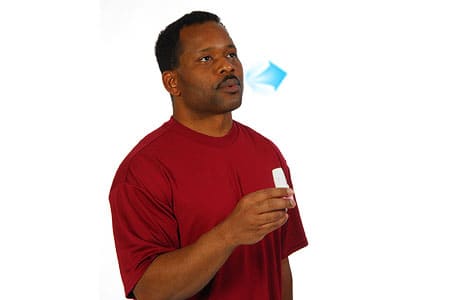
Breathe out completely. Breathe out slowly and completely. Hold the inhaler away from your mouth when you breathe out. Do not breathe out into the inhaler. This can blow some of the powder out of the inhaler. Also, the moisture in your breath can cause the dry powder to clump together and clog the inhaler.

Place the inhaler in your mouth. Close your lips tightly around the mouthpiece.

Inhale. Breathe in quickly and deeply through your mouth for 2 or 3 seconds. This pulls the powder from the inhaler into your lungs. After you have inhaled the powder, take the inhaler out of your mouth.
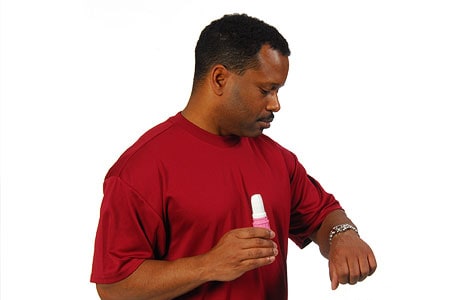
Hold your breath. Hold your breath for 5 to 10 seconds. This will let the medicine settle in your lungs. Then slowly breathe out through pursed lips. Make sure not to breathe out into the inhaler.

Rinse your mouth. If you are inhaling steroid medicine, rinse your mouth out with water after use. Don't swallow the water. Swallowing the water will increase the chance that the medicine will get into your bloodstream. This may increase the side effects of the medicine.
Credits
Current as of: September 29, 2025
Author: Ignite Healthwise, LLC Staff
Clinical Review Board
All Ignite Healthwise, LLC education is reviewed by a team that includes physicians, nurses, advanced practitioners, registered dieticians, and other healthcare professionals.
Current as of: September 29, 2025
Author: Ignite Healthwise, LLC Staff
Clinical Review Board
All Ignite Healthwise, LLC education is reviewed by a team that includes physicians, nurses, advanced practitioners, registered dieticians, and other healthcare professionals.
This information does not replace the advice of a doctor. Ignite Healthwise, LLC disclaims any warranty or liability for your use of this information. Your use of this information means that you agree to the Terms of Use and Privacy Policy. Learn how we develop our content.
To learn more about Ignite Healthwise, LLC, visit webmdignite.com.
© 2024-2025 Ignite Healthwise, LLC.


